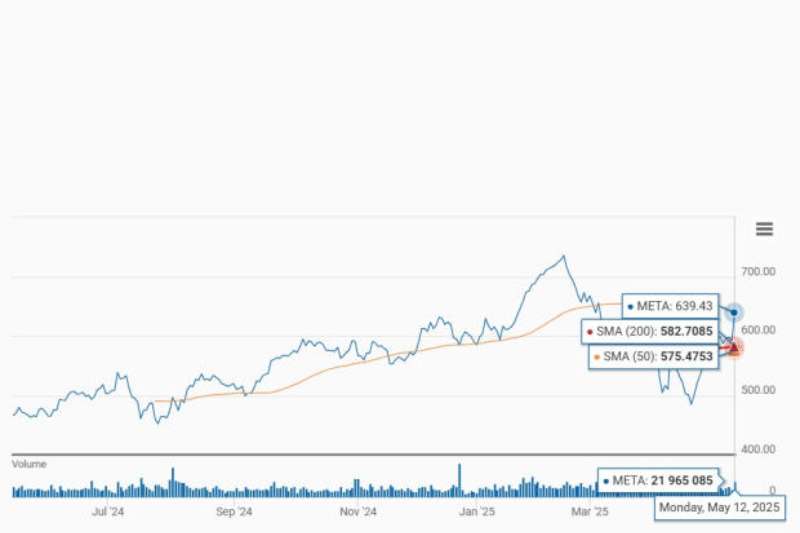
Meta Platforms Inc. (NASDAQ: META) has become a tech powerhouse. From dominating social media to exploring artificial intelligence, smart glasses, and even crypto payments, the company is in the headlines for all the right reasons.
But with a price-to-earnings (P/E) ratio of 24.18x, is META stock still worth buying in 2025? Or should you consider holding or even selling?
Let’s explore the valuation and investment case for Meta in plain language.
A P/E ratio of 24.18x suggests investors are paying $24.18 for every $1 of Meta's earnings. It reflects investor expectations for future growth.
Compared to the S&P 500 average P/E of around 20, Meta is trading at a modest premium. In tech, such a ratio is considered fairly normal. Microsoft trades closer to 35x and Apple around 28x, which puts Meta in a mid-tier valuation zone.
Investors are paying for Meta’s expected earnings growth, especially from AI and digital advertising.
Meta recently reported strong quarterly earnings. Revenue in Q1 2025 reached $36.5 billion with expanding profit margins. CEO Mark Zuckerberg has aggressively reduced costs, including staff cuts, while ramping up AI integration across all platforms.
Meta AI is now embedded in Facebook, Instagram, and WhatsApp. The AI assistant is also powering new devices like the Ray-Ban smart glasses, helping Meta enter the wearables market in a big way.
This innovation has fueled investor optimism and supported Meta’s current valuation.
META stock is still driven largely by its advertising business. Despite global economic concerns, digital ad spending is recovering in 2025. Meta's strong targeting algorithms and large user base make it a preferred choice for advertisers.
The rise of short-form video and AI-driven ad placement could further boost earnings in the coming quarters.
Although less talked about lately, Meta’s Reality Labs division continues to develop metaverse-related products. These initiatives are costly but represent a long-term bet.
While Reality Labs has been operating at a loss, some investors see it as a future growth engine once the virtual and augmented reality space becomes more mainstream.
One of the biggest risks to Meta stock in 2025 comes from increasing regulatory pressure. The US Federal Trade Commission (FTC) continues its antitrust case, accusing Meta of monopolistic practices in social media.
In the EU, Meta is facing legal challenges over how it uses personal data to train its AI models. New data privacy rules could restrict the company’s AI ambitions or result in hefty fines.
These cases create headline risk and may impact investor confidence in Meta shares.
Meta is reportedly exploring stablecoin integration for payments within Facebook and WhatsApp. The company aims to help creators get paid directly through digital wallets using coins like USDC or USDT.
This marks a return to the crypto space after the failure of Libra. While exciting, it also brings regulatory uncertainty and trust concerns among users and governments.
Here’s a breakdown to help guide your decision.
Buy META Stock If
You believe in Meta’s AI strategy and future ad growth
You’re confident in long-term innovation like smart glasses and wearables
You’re comfortable with some legal risk and are investing for growth
Hold META Stock If
You already own Meta shares and want to wait for clearer regulatory outcomes
You’re watching to see how AI monetization and crypto payments evolve
You believe the stock is fairly valued and want to stay invested
Sell META Stock If
You think 24.18x PE is too high for the risk
You’re concerned about regulation or slowing user growth
You want to rotate into safer or more diversified tech stocks
Most Wall Street analysts still rate Meta as a Buy or Strong Buy. The current P/E ratio reflects optimism about future profits but also carries expectations.
If Meta misses on revenue or growth, the stock could decline quickly. But if AI, advertising, and hardware sales continue growing, the upside is still considerable.
Meta’s 24.18x PE ratio in 2025 is reasonable given the company’s strong fundamentals and aggressive push into AI and hardware. However, it also includes potential regulatory risk and pressure to perform.
If you’re confident in Meta’s strategy and are in it for the long term, buying or holding makes sense. If you’re risk-averse or worried about antitrust cases, you might want to wait or consider selling into strength.
Whatever your choice, META stock remains one of the most watched tech stocks in 2025.